Organic waste collection has become a growing priority as the city seeks to reduce the amount of waste that ends up in landfills, though its composting efforts have been rolled out in fits and starts over the last decade.
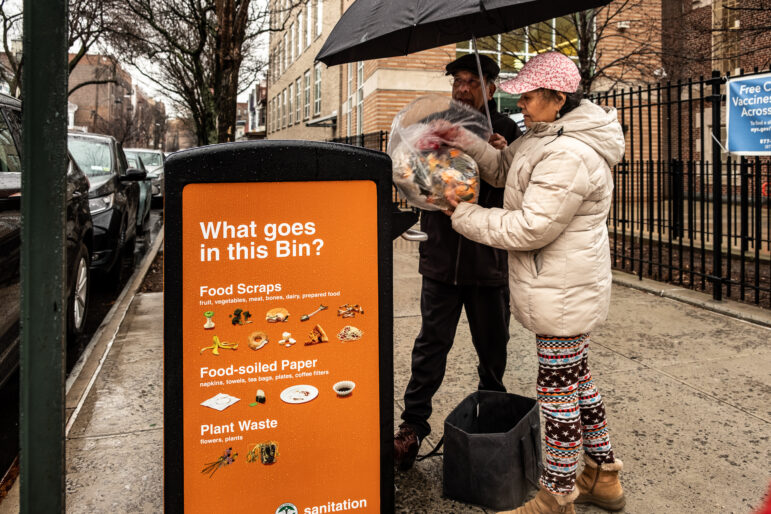
Adi Talwar
Husband and wife Manuel, 70, and Melida Peraza, 68, dropping off compostable waste at a smart bin in the Bronx. The Perazas have been using the bin about twice a week.Compost drop-off bins that residents can access 24/7 have arrived in dozens of New York City neighborhoods this year, in the city’s latest effort to expand organic waste collection.
The Sanitation Department installed approximately 200 new compost “Smart Bins” in early 2023, up from just 30 launched as part of a pilot program in December 2021. The bins will serve as a complement to the city’s curbside composting program, which is available in certain community districts. The city also offers over 200 food scrap drop-off sites, most of which are open year round.
Residents can unlock and deposit food scraps in the bins using one of two smartphone applications. The majority of the new bins are located across upper Manhattan, The Bronx, and Brooklyn and accessible through the NYC Compost app, and another 10 located in Lower Manhattan accessible through the eGate Digi app.
The new fleet of bright orange “Smart Bins” comes after a year-long pilot program spearheaded by the Sanitation Department and the Alliance for Downtown New York. The Sanitation Department touted the program, stating they found the bins full of food and yard waste almost every day.
“We are thrilled with their success and look forward to expanding their presence across the city,” said Vincent Gragnani, a press secretary for the Sanitation Department.
Organic waste collection has become a growing priority as the city seeks to reduce the amount of waste that ends up in landfills, though its composting efforts have been rolled out in fits and starts over the last decade. Former Mayor Mike Bloomberg first introduced food scrap pickups—a practice, he said, that would eventually be mandatory—back in 2013.
And while his successor Bill de Blasio pledged to expand curbside composting as part of his 2015 “Zero Waste” plan, the program was slow to get off the ground, with officials citing high administrative costs and low participation. The city then suspended the pickups altogether amidst the financial turmoil of the COVID-19 pandemic, reinstating it a year later but only in certain community districts, and requiring residents to opt into the program.
This past fall, Mayor Adams—who’d initially proposed halting the expansion of organics collection in his preliminary budget last year—announced he’d be adding pickups across all of Queens, what he called the “nation’s largest curbside composting program” in an effort to keep streets clean and fight climate change. He promised to dedicate $2.6 million out of the current $104 billion Fiscal Year 2023 budget to run the pilot.
According to data from the Sanitation Department, around 12.7 million pounds of organic waste were collected from the Queens curbside composting in fall 2022. After three months of operation, it’s now on hiatus until March 2023, to the upset of some local leaders who say the pause will disrupt the successful momentum it’s earned.
Environmental advocates and some lawmakers continue to push for mandatory, citywide composting collection,* following in the footsteps of cities like San Francisco and Boulder, CO.
“Organic waste currently makes up a third of what our City sends to landfills, resulting in hundreds of thousands of tons of greenhouse gas emissions every year,” City Councilmember Shahana K. Hanif, who introduced a bill last year that would establish such a program, wrote in an oped for City Limits in April.
The city included about $32 million in the current fiscal year budget for its total composting efforts, including for curbside pickup service, drop-off locations and school programs, Gotham Gazette reported last June. In his preliminary budget unveiled last week for the upcoming fiscal year that starts in July, Mayor Adams proposed allocating over $1.8 billion for the Sanitation Department’s overall budget—down about 5.6 percent from the current year—though officials did not immediately respond to City Limits’ requests for specifics on composting spending.
According to data obtained from the New York City Independent Budget Office, the city spent $8,057,696 to process compost in Fiscal Year 2023, and has allocated $6,951,575 for Fiscal Year 2024, though those funds do not include labor costs.
According to Gragnani, organic waste from the smart bins is picked up on a regular basis and sent to various locations including Staten Island Compost Facility; Nature’s Choice, a compost facility in New Jersey; Newtown Creek Wastewater Treatment Plant for anaerobic digestion; and Pine Island Farm digester in Massachusetts. The Sanitation Department website says that materials turned into compost will be used to “beautify green spaces across the city.”
Over the course of the “Smart Bin” pilot program, from Dec. 2021-2022, the Sanitation Department and the Alliance for Downtown New York collected a total of 340,000 pounds of organic waste from 30 bins, with over 5,500 users between both locations.
Jaya Saxena and Mattie Lubchansky were among the first to try the bins as part of the Astoria pilot program. The Queens residents said they were frequent users of the “Smart Bins” before their building got curbside composting in fall 2022. While they’ve seen good engagement among their neighbors, they said the bins are sometimes mistaken for trash cans.
“I completely understand why they lock it because I also do see people just piling up random trash near it,” said Saxena.
In response to these concerns, Gragnani said the cans are rat-proof, adding, “We have not found people stacking trash on or near the bins to be an issue.”
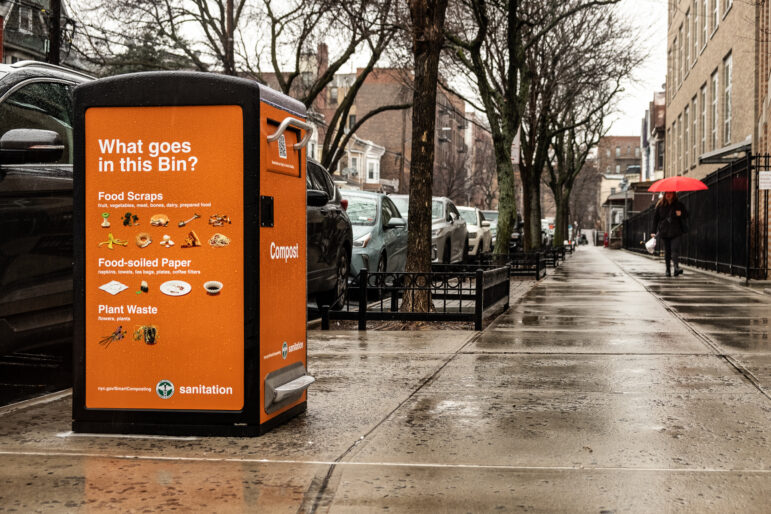
Adi Talwar
A smart bin for compost waste located near P.S. 056 in the Bronx.
Another issue cited by Queens residents was the lack of publicity about the bins. Erin Kelley, 33, doesn’t remember receiving any information before they were installed. “When they started popping up, no one knew what they were,” she said.
Despite this, Kelley said she uses the bins every other week and has been able to deposit more compost than normal.
Last month, Lincoln Restler, the councilmember for the 33rd District in Brooklyn, introduced a bill that would mandate five “Smart Bins” in each community district, with emphasis on high traffic areas. Still, it remains to be seen how practical the bins will be and exactly how they will interface with the curbside composting program.
Ushma Pandya Mehta, one of the co-founders of Think Zero, which helps businesses with waste reduction and diversion services, said sending out collection trucks to gather organic waste from the bins may get expensive if there’s not much to pick up.
“You need to have a dense route [and] you need to have enough volume otherwise you’re sending trucks using gas or diesel,” she said. The Sanitation Department did not comment on if organic waste pickup from the bins is included in regular curbside composting or trash pickups, or collected separately.
Sandra Goldmark, a professor at Barnard College and assistant dean at the Columbia Climate School, also voiced skepticism regarding the long term viability of the bins and the user base, saying they’re more likely to attract people who are already in the habit of composting.
“A ‘Smart Bin’ is something that does feel very specialized and very much likely to be used by somebody who’s already a true believer,” she said.
But not everyone feels that way.
“For me, I never composted before, and it pushed me to do it,” said Kelley. “So I wonder if it’s done the same for other people.”
*Three days after this piece was published, Mayor Eric Adams pledged in his State of the City address to expand curbside composting collection citywide by the end of 2024.


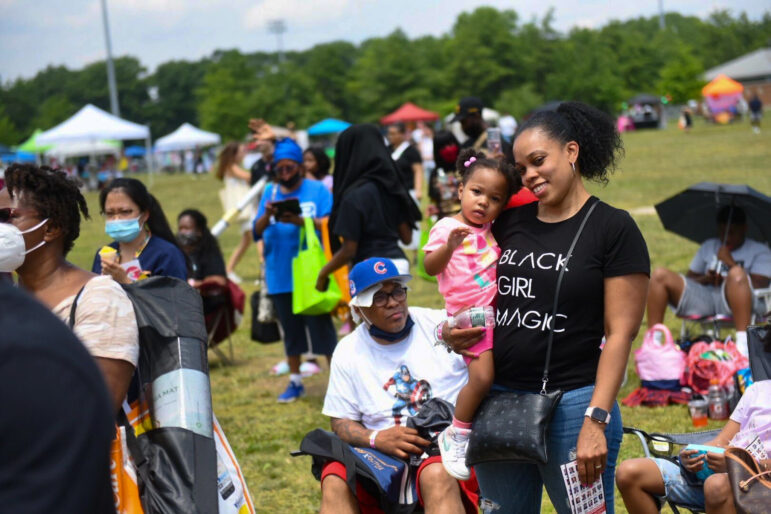
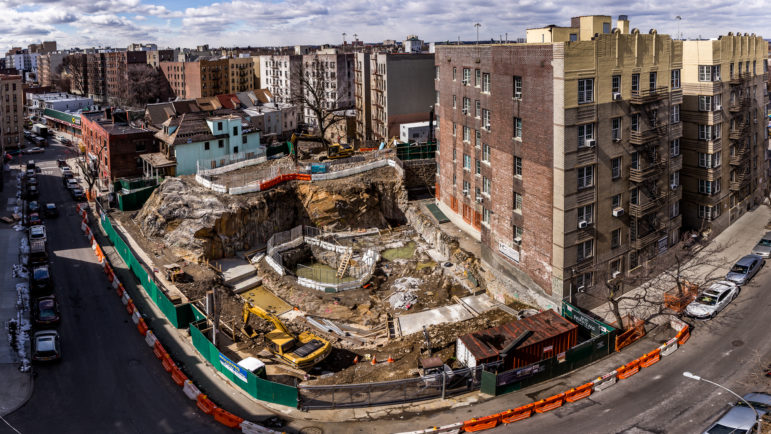

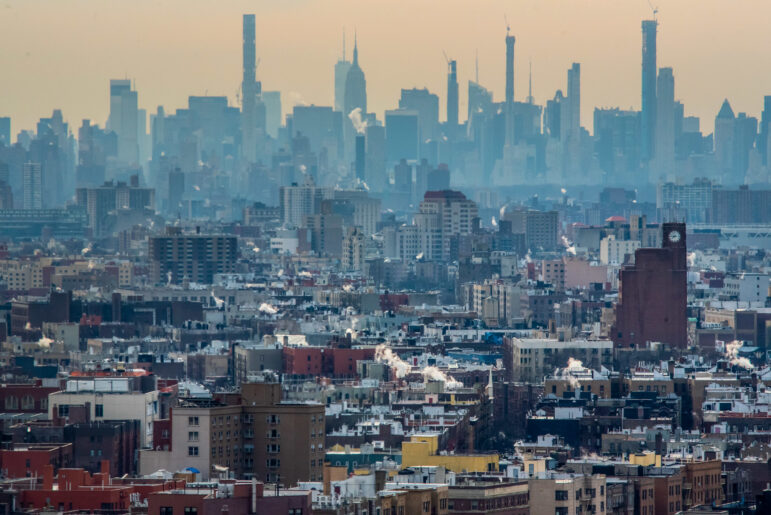



6 thoughts on “Sanitation Department Adds 200 ‘Smart Bins’ in NYC’s Latest Composting Expansion”
Composting programs have failed twice in recent years due to lack of interest. So of course the DSNY goes for strike-3.
bs — i use the one downtown st george and another right in front of the ferry regularly — its great and easy. and btw trump lost.
Wonderful article. Kudos to Mary Cunningham!
Wow, if you live on Staten Island, you should be glad about these programs, because Staten Island is a part of the city that was buried in refuse from all over NYC. It was a real problem for Staten Islanders! Every recycling program reduces the likelihood that folks in the outer boroughs will find themselves living next to an overcrowded, unmanageable dump. Even if the new composting programs turn out to be flawed, it’s important for us to try. I’ve been using the comprehensive compost option for more than two years and I think it’s great. If we find out the smart bins don’t work, we just have to keep tweaking the system. I have lived in areas where these programs work and we can do it too. We must figure this out. Food waste is a valuable resource when managed correctly.
This is a great new program! Can we get a bin at 86th Street and Columbus? Lots of traffic and no shortage of conscientious New Yorkers.
Why were these bins rolled out in high concentrations in areas that have low participation rates when they could have been spread out throughout the City? If Staten Islanders don’t want them, then we’ll gladly take them in Downtown Brooklyn/Heights.